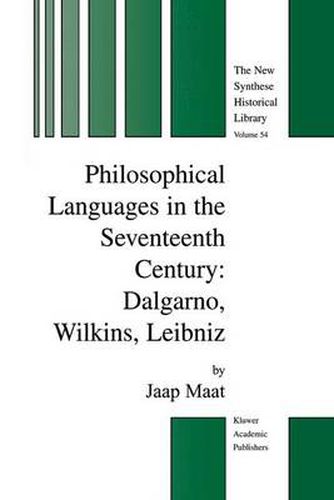Readings Newsletter
Become a Readings Member to make your shopping experience even easier.
Sign in or sign up for free!
You’re not far away from qualifying for FREE standard shipping within Australia
You’ve qualified for FREE standard shipping within Australia
The cart is loading…






This title is printed to order. This book may have been self-published. If so, we cannot guarantee the quality of the content. In the main most books will have gone through the editing process however some may not. We therefore suggest that you be aware of this before ordering this book. If in doubt check either the author or publisher’s details as we are unable to accept any returns unless they are faulty. Please contact us if you have any questions.
This book gives a clear and thorough description of three fascinating linguistic projects that were carried out in the seventeenth century: the philosophical languages of George Dalgarno (1661) and John Wilkins (1668), as well as the work of Leibniz in this area. These projects combined practical purposes, such as improving communication, with profound theoretical insights concerning the representation of knowledge and the nature of language. Rich in detail, this book provides all the material for a proper understanding of the workings of these schemes, while illuminating the intellectual context in which they took shape. It will be welcomed by anyone interested in the history of linguistics and philosophy of language. This book: - offers in-depth analysis of the two most sophisticated universal language schemes created in the seventeenth century: the philosophical languages of Dalgarno and Wilkins, supplementing existing literature in focusing on the internal details of the languages, highlights and documents the controversy between Dalgarno and Wilkins, largely ignored in most other books on the subject, showing that their schemes resulted from different, and in various respects antagonistic approaches, presents a careful account of Leibniz’s plans for a philosophical language, and illustrates, in discussing his philosophy of language, how his thought was formed in constant interaction with contemporaries, discusses at greater length than usual the extensive work Leibniz did in carrying out his plans, and shows to what extent he was indebted to Dalgarno and Wilkins, emphasizes the importance of the logical tradition for the structure of artificial languages constructed in the seventeenth century, and clarifies the role played by dominant views of the relation between spoken and written language, maintains a fine balance between historical research and argument, presenting what was said as accurately as possible and placing it within its proper context, but also attempting to evaluate the views described, is of interest to linguists, philosophers and historians of ideas.
$9.00 standard shipping within Australia
FREE standard shipping within Australia for orders over $100.00
Express & International shipping calculated at checkout
This title is printed to order. This book may have been self-published. If so, we cannot guarantee the quality of the content. In the main most books will have gone through the editing process however some may not. We therefore suggest that you be aware of this before ordering this book. If in doubt check either the author or publisher’s details as we are unable to accept any returns unless they are faulty. Please contact us if you have any questions.
This book gives a clear and thorough description of three fascinating linguistic projects that were carried out in the seventeenth century: the philosophical languages of George Dalgarno (1661) and John Wilkins (1668), as well as the work of Leibniz in this area. These projects combined practical purposes, such as improving communication, with profound theoretical insights concerning the representation of knowledge and the nature of language. Rich in detail, this book provides all the material for a proper understanding of the workings of these schemes, while illuminating the intellectual context in which they took shape. It will be welcomed by anyone interested in the history of linguistics and philosophy of language. This book: - offers in-depth analysis of the two most sophisticated universal language schemes created in the seventeenth century: the philosophical languages of Dalgarno and Wilkins, supplementing existing literature in focusing on the internal details of the languages, highlights and documents the controversy between Dalgarno and Wilkins, largely ignored in most other books on the subject, showing that their schemes resulted from different, and in various respects antagonistic approaches, presents a careful account of Leibniz’s plans for a philosophical language, and illustrates, in discussing his philosophy of language, how his thought was formed in constant interaction with contemporaries, discusses at greater length than usual the extensive work Leibniz did in carrying out his plans, and shows to what extent he was indebted to Dalgarno and Wilkins, emphasizes the importance of the logical tradition for the structure of artificial languages constructed in the seventeenth century, and clarifies the role played by dominant views of the relation between spoken and written language, maintains a fine balance between historical research and argument, presenting what was said as accurately as possible and placing it within its proper context, but also attempting to evaluate the views described, is of interest to linguists, philosophers and historians of ideas.